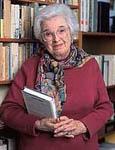
A pioneer of women's history, Professor Gerda Lerner worked tirelessly over the course of her career to develop the field within academia. She died Jan. 2, 2013, in Madison, Wis.
In 1963, Lerner earned her B.A. from the New School for Social Research in New York. She then received her Ph.D. in American History from Columbia University in 1966. Lerner returned to Columbia to pursue women's history, a field not yet considered a formal area of study. There she began her battle to gain recognition of women's history as a separate, specialized discipline. That same year Lerner joined fellow activists Betty Friedan, Pauli Murray, Aileen Hernandez and others in founding the National Organization for Women (NOW).
Upon receiving her doctorate, Lerner began teaching at Long Island University. She is credited with teaching the first post-World War II college course in women's history. Lerner soon moved on to Sarah Lawrence College, where she founded the first graduate program in women's history in 1972 and served as its director from 1972-76 and 1978-79. In 1980, she began teaching at the University of Wisconsin-Madison. There, she established a Ph.D. program in women's history and continued to help similar fledgling programs at universities throughout the country. In 1981, Lerner became the first female president in 50 years of the Organization of American Historians.
Gerda Lerner's accomplishments and contributions to the field of women's history have been fundamental to its development. Her many works include The Grimke Sisters from South Carolina: Pioneers for Women's Rights and Abolition (1998), The Woman in American History (1971 textbook), The Majority Finds Its Past: Placing Women in History (1979), Why History Matters (1997), and numerous other significant essays and texts that have helped direct the study of American, women's and global history. In 2002, she published Fireweed: A Political Autobiography.
Professor Lerner's obituary may be read on the website of the New York Times.


